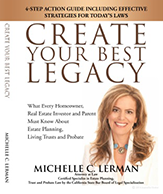If You Have Minor Children, You Need A Will.
Through a will, you can nominate a guardian for your minor children upon your death. Choosing a guardian should be a carefully reasoned decision made by you, the parents. Without a will, a court will make the decision for you.
If You Own A Home, Consider A Living Trust.
Eliminate probate fees, delays and hassles by holding assets in a living trust. A family in California owning a home worth $500,000 will have to pay statutory probate fees of about $22,000. If this same family put their assets into a living trust, the probate fees would be zero.
Joint Tenants Beware.
Unmarried individuals holding property as joint tenants could have to pay double estate taxes. The results for married couples can be equally costly because the surviving spouse does not get the full benefit of the step up in tax basis upon the first spouse’s death. In other words, the surviving spouse selling a property held as community property instead of joint tenants could save significant taxes on the resale of the property. Case law also allows couples to save significant estate taxes on community property by allowing them to take a 15% valuation discount. Usually the benefit of the added creditor protection for joint tenancy property is far less than the benefits of holding property as community property.
A Bypass Trust Can Save Taxes.
Leaving all your assets to your spouse could be disastrous estate planning. If your spouse dies owning property valued at more than the Applicable Unified Credit, your estate will be subject to estate tax.
A Bypass Trust And / Or QTIP Trust Can Protect Your Children.
Even if you do not have a taxable estate, you may want to have a Bypass Trust and/or a QTIP Trust so that after your spouse’s death, ½ of your estate will go to your children. Without a Bypass and/or QTIP Trust, your children may not receive any of your assets.
Choosing The Beneficiary Of Your Retirement Plans And Life Insurance.
Under certain circumstances, you can name your revocable trust as the beneficiary of retirement plans. Review your beneficiary designations carefully, and confirm that your designations comply with the current law. You might also consider having your living trust as the beneficiary of your life insurance to protect some of the proceeds from a second spouse. If you have young children, the trust can be the secondary beneficiary to protect the children.
All Living Trusts Are Not Alike.
Beware of trust mills. Without proper planning, estate taxes could eat up as much as 45% to 55% of your estate. A bypass and marital trust will allow a couple to completely avoid estate taxes on up to $4 million (depending on the applicable exclusion amount) of their estate. A QTIP trust can assure that property goes to your children, not to a second spouse. Address issues such as the type of formula clause that fits your estate, whether your spouse should be the sole trustee, and whether you want a separate share trust for your children or a family sprinkling trust.
Your Family May Receive Only Half Of Your Life Insurance Proceeds.
If the gross value of the estate including life insurance exceeds the amount of the applicable exemption, the excess will be subject to federal estate tax. Having an irrevocable life insurance trust own the life insurance allows 100% of your insurance proceeds to pass to your heirs with no estate taxes.
Tax Laws And Personal Circumstances Change. Review Your Current Estate Plan At Regular Intervals.
Although one of the biggest mistakes people make is dying without a will, the second is not updating your will. An estate plan should be reviewed upon any major life-changing event (birth or adoption of a child, marriage, divorce, moving to a new state) and upon every major tax law change. At a minimum, you should review your plan every 2 years.
Considering Preparing An Ethical Will.
An ethical will is a non legal document in which you share your wisdom, your values, and your hopes and dreams with your family. Even if all your estate planning is up to date and in legal order, if you haven’t prepared an ethical will, your family won’t know all that you want them to. Leaving your family with a writing that embodies who you are is a living legacy.
Checklist Of Questions In Reviewing Your Current Plan
- Do we have a bypass trust or QTIP trust in our living trust?
- Is our trust for children a separate share trust or a family pot trust?
- Do we need a life insurance trust and is the amount and type of insurance adequate?
- Do we have a buy-sell agreement for our business?
- Have we reviewed our estate plan within the last 2 years?
- Are all of our assets (house, bank accounts, partnership interests and personal property) in our living trust?
- Do we own any property as joint tenants?
- Have we considered whether we should own any of our assets in a “limited liability company”?
- Who is the beneficiary of our retirement plans (spouse or the trust)?
- Have we put our estate planning documents in a safe place (a safe deposit box or fireproof safe)?


